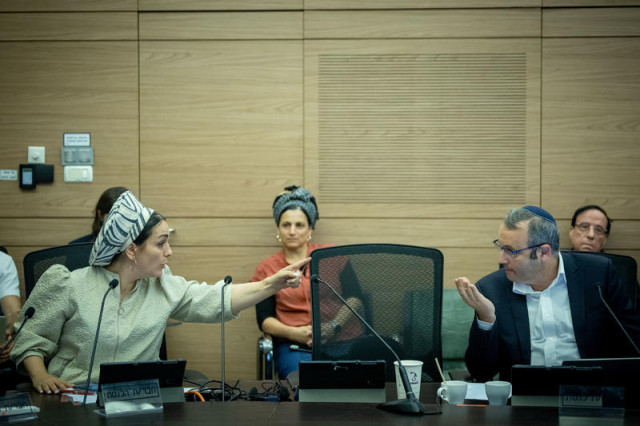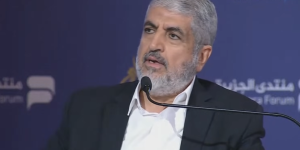‘Death penalty for terrorists’ bill takes first hurdle in Knesset amid raucous debate
MK Son Har-Melech: 'No more prisons. No more deals - but a death sentence'

The controversial law proposal to introduce the death penalty for terrorists passed its first reading in the Knesset on Monday evening, as the bill sponsored by Jewish Power MK Limor Son Har-Melech was approved with 39-16 votes.
Despite having the tentative backing of the coalition, the bill is highly controversial as it would mandate the death penalty for those who commit a nationalistically motivated murder of a citizen of Israel.
“It is proposed to determine that anyone who caused, intentionally or through indifference, the death of an Israeli citizen out of racist motives or hostility toward the public, and with the purpose of harming the State of Israel and the rebirth of the Jewish people in its land, shall be punishable by death,” the bill’s explanatory note reads.
“It is also proposed to provide that in the military courts in the Judea and Samaria region, the death penalty may be imposed by a simple majority of the judges on the panel, and it will not be possible to mitigate a death sentence that has been imposed.”
The vote was boycotted by the opposition, except for Avigdor Liberman’s hawkish Yisrael Beytenu party, which supported the bill. The ultra-Orthodox United Torah Judaism party also boycotted the vote.
Opponents criticized the bill for potentially leading to racial discrimination, as it appears to only target Arabs.
Knesset member Son Har-Melech explained on Tuesday that the law would apply only to those who “harm the State of Israel.” Asked whether this would also apply to Jews, she said, “If there are such Jews, then yes. But there’s no such thing as a Jewish terrorist.”
The passing of the bill caused strong reactions from its supporters and opponents.
עוצמה יהודית בדרך לעשות היסטוריה pic.twitter.com/w0aMiWC742
— איתמר בן גביר (@itamarbengvir) November 10, 2025
Jewish Power chairman Itamar Ben Gvir began handing out Baklava sweets in the chamber, before Knesset security stopped him and confiscated the sweets.
The handing out of Baklava has often been seen in Palestinian towns after terror attacks.
“Those who murdered, raped, and kidnapped our sons and daughters do not deserve to see the light of day, and their sentence should be death,” Ben Gvir said in a statement. “The death penalty law is not only a moral and just step, but also critical to the security of the state.”
Hadash-Ta’al chairman Ayman Odeh started shouting, “You wanted to carry out a transfer – and you failed... A bunch of weaklings – you will be expelled, and the Palestinian people will remain, the cursed occupation will end, and the State of Palestine will be established despite you and to your fury.”
Odeh and Ben Gvir then traded insults before Odeh was taken away by security. Hadash-Ta’al lawmaker Ahmad Tibi and Ra’am MK Waleed Taha were also removed amid verbal exchanges with coalition lawmakers.
MK Gilad Kariv of The Democrats warned that a death penalty law would cause “an increase in terror attacks” and “bring about dramatic international pressure at a time when the State of Israel is already on the edge.”
Son Har-Melech recounted that she came to speak on behalf of “all the victims of Palestinian terror,” following the murder of her husband in a terror attack in 2003. The terrorist who led the attack later took part in the Oct. 7 massacre.
“When the message is unequivocal, without loopholes and without equivocation, the death penalty for terrorists law changes perception. It changes the paradigm. No more prisons. No more deals. No more suspended sentences. But a death sentence. Because it’s very simple: when a terrorist dies, he does not return to the circle of terror and will not be released alive,” she argued.
“No more mercy, no more hesitation. We choose life, and whoever chooses death will bear the consequences of his actions.”
The future of the proposed law is still uncertain. The bill will now be returned to a committee for further discussions and refinements before requiring two more votes to be passed into law.
The most important factor is the support from the Likud Party and its chairman, Prime Minister Benjamin Netanyahu.
In the past, he has opposed death penalty bills for various reasons, and the top brass of the security services are also said not to be in favor.
A few months ago, Brig.-Gen. (res.) Gal Hirsch, the coordinator for the hostages in the Prime Minister’s Office, had opposed the bill, arguing it could harm negotiations with Hamas to reach a hostage deal.
But last week, Hirsch said that Netanyahu was now backing the bill as the situation had changed.
After the release of the last living hostages, Ben Gvir had given Netanyahu an ultimatum to advance the law to its first reading within three weeks or face another voting boycott from Jewish Power.
If the bill advances further, the U.S. can also be expected to pressure Netanyahu not to support it.
Israeli law formally contains provisions for a death penalty, but the only case in which it was ever implemented was that of Nazi officer, Adolf Eichmann, one of the architects of the Holocaust, who was executed in 1962.

The All Israel News Staff is a team of journalists in Israel.
You might also like to read this:

















